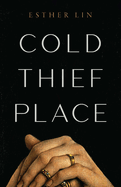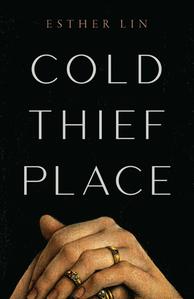
 Esther Lin's poems are filled with stories: those of Odysseus and Emma Bovary and Anna Karenina, and those of the author's father, her grandfather, and her mother. In Cold Thief Place, 2023 Alice James Award winner Lin offers a haunting collection that draws upon memory and history, both her own and her ancestors'. In early poems like "I See Her Best," the details of her mother--"Hair glossy as a catfish flank./ A lone woman released from China/ to join her fiancé in Vietnam"--stand out more clearly than those of Lin herself, whose name, the poem tells us, "means hidden one."
Esther Lin's poems are filled with stories: those of Odysseus and Emma Bovary and Anna Karenina, and those of the author's father, her grandfather, and her mother. In Cold Thief Place, 2023 Alice James Award winner Lin offers a haunting collection that draws upon memory and history, both her own and her ancestors'. In early poems like "I See Her Best," the details of her mother--"Hair glossy as a catfish flank./ A lone woman released from China/ to join her fiancé in Vietnam"--stand out more clearly than those of Lin herself, whose name, the poem tells us, "means hidden one."
Lin is a champion for undocumented writers, and several poems trace her experience as a child born in Brazil to Chinese immigrants living undocumented in the United States. "The Real Thing" describes a trip from New York to Virginia, where they visit a lawyer and the DMV. She is asked, laughingly, "Your English is so good. How can you/ be illegal?" The rhythmic poem makes skilled use of repetition, sometimes of single words, sometimes long phrases that layer meaning on each iteration. Similarly, in the series of poems focused on Lin's green card marriage, the repeated use of the terms "petitioner" and "beneficiary" makes clear the difficulty knit into a marriage resulting from "three thousand dollars,/ the market rate for men/ who petition for illegal women." In later poems, when Lin uses the word "husband," there is a different tone, a warmth absent from the legal terms.
Marriage, and the many reasons behind it, is a recurrent element in these poems. In "The Ghost Wife," Lin uses short, sharp lines to emphasize a certain violence inherent in the lack of choice many women face, women who might believe: "You are not nothing/ before you marry./ Rather, you are simply/ one without a story./ Become a wife./ That is a metamorphosis/ worthy of legend." So many of the poems that look closely at her mother's life, before she became a wife and mother, have a searching quality, as if Lin is looking for herself in them. She keeps finding these commonalities, although other poems chronicle the many ways her mother was difficult or even abusive. She asks, "did we share/ this too/ our bodies/ houses for our/ best stories." Despite their varied subjects, each poem tells Lin's story, documenting her history and creating space for other voices like her own. --Sara Beth West, freelance reviewer and librarian
Shelf Talker: Cold Thief Place is a perceptive collection from a poet with a powerful voice, unafraid to name injustice or face raw truths as she probes a complicated family history.

